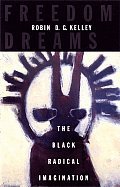? Books, Book 4: Freedom Dreams
 "All who have accomplished great things have had a great aim, have fixed their gaze on a goal which was high, one which sometimes seemed impossible." "All men who have achieved great things have been great dreamers." - Orison Swett Marden
"All who have accomplished great things have had a great aim, have fixed their gaze on a goal which was high, one which sometimes seemed impossible." "All men who have achieved great things have been great dreamers." - Orison Swett MardenI've taken a long time to review this book because I wasn't sure what I wanted to say. That hasn't changed and this likely won't be my best...but here goes:
"I have come to realize that once we strip radical social movements down to their bare essence and understand the collective desires of people in motion, freedom and love lay at the very heart of the matter," writes Robin D.G. Kelley in Freedom Dreams: The Black Radical Imagination. Kelley then sets out a survey of black radical movements ranging from Back to Africa, communist and Marxist allignment, Third World consciousness, black feminism, and connections to surrealism. While Kelley elucidates how the Cuban Revolution and, even stronger, Mao's Cultural Revolution spurred the dreams of newborn radical organizations like the Black Panther Party and the little-known Revolutional Action Movement (RAM), he cautions that, "I don't pretend to have written anything approaching a movement history or an intellectual history, and I am not interested in explaining why these dreams of revolution have not succeeded (yet!)."
Kelley's caveat proves personally problematic at times because it eats at just how imagination, vision, and everyday political work co-exist and interact. Many of these radical movements to which Kelley devotes a significant amount of pages (e.g. RAM) were ultimately unsuccesful in creating the world of freedom as they had imagined. Should we simply ignore the unmet goals and intra-organizational problems of these movements and appreciate the spirit of their motives? Admittedly, it gets increasingly difficult to "imagine" with Kelley when, after pages of dedication, he himself admits, "We know with hindsight that millions of people were jailed, beaten and killed in the name of the Cultural Revolution; inside China itself, it hardly constituted a bright moment in socialist history."
The last chapter, which seemed to be well-received by some, on Surrealism as a state of mind centered around the work of both Aimé and Suzanne Césaire probably should get a re-read. I think I was exhausted by the survey of radical movements which becomes increasingly harder to read when: 1. there are lists and lists of names and organizations 2. movement after movement with some receiving significant more focus than others 3. I went from being familiar to not to familiar again and not knowing whether that knowledge was important to remainder of the reading. By the time I moved on to this chapter, I wasn't as involved as before. That being said, I did enjoy the survey as I feel motivated to do further readings on those particular movements which piqued my interest and it served as a google-earth timeline of radical movements.
I read this book because I usually shy away from action-oriented books grounded in ideas like imagination, dreaming, and vision. If the exercise of such faculties in the poli-social realm move you, I'm confident the book is worth at least the short read. Other than the survey, I probably didn't take much from it.

0 Comments:
Post a Comment
<< Home